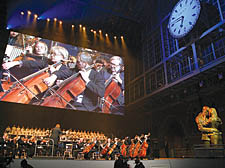|
|
 |
| |

The Royal Philharmonic Orchestra opened the ceremony |
It’s full steam ahead for new age of the train
The Queen’s royal seal of approval heralds a new age of the train with the official opening of St Pancras International station, writes Dan Carrier
IN A cloud of dry ice illuminated by lasers, accompanied by a
fanfare provided by the Royal Philharmonic Orchestra and watched over by Her Majesty the Queen, train drivers carefully rolled Japanese-built 200 mile per hour locomotives up to the platforms of St Pancras station on Tuesday night to usher in a new age of the train.
The station was officially opened by the Queen and Britain’s first high-speed trains that will whisk passengers to Paris were greeted by more than 1,000 guests who had been invited to
celebrate the restoration of the historic station.
The six-year, £6 billion project means you can now step on a train in the heart of Somers Town and arrive in the Gare Du Nord in France in little more than two hours.
It is also being billed as a catalyst for the regeneration of east London, where the new rail route speeds through, and is crucial to government plans for new towns in Kent and the Thames estuary.
The guest list included Prime Minster Gordon Brown, London Mayor Ken Livingstone and former Deputy Prime Minister John Prescott, who campaigned to have the link built.
Islington Council was represented by leader James Kempton and his deputy Lucy Watt.
After making their way through tight security, guests were greeted by teams of waiters with glasses of champagne in the former beer storage undercroft, where vaulted brick ceilings have been exposed and iron columns stripped back.
Then it was upstairs to temporary grandstands overlooking the dramatic concourse.
Lit by searchlights and with giant cinema screens on lighting rigs, the Queen was called on by the chief executive of London and Continental Railways Rob Holden to declare the station open.
But first a corporate advert, lasting for nearly an hour, was broadcast to sell the train as a new, green way to travel abroad.
It featured gushing accolades from the likes of Formula 1 driver David Coulthard – he called the project “a triumph of precision engineering” – through to the actress Kristin Scott Thomas, who was filmed coquettishly eating chocolates surrounded by unfeasibly good-looking passengers.
The shameless salesmanship could have swamped the giant building.
However, as the spotlights played across the huge iron span of the Barlow shed that resembles a whale’s rib cage, and the trains slipped into the platforms in plumes of dry ice, nothing could detract from the amazing restoration of this landmark.
The ceremony was hosted by actor Timothy West, fresh from a stint as King Lear at the Old Vic Theatre.
He took on the guise of the stations Victorian designer William Henry Barlow, and told the story of how St Pancras was built nearly 140 years ago.
He said: “The shed had become the haunt of pigeons, broken pains had let the water in.
“Six years ago the restoration began, and it will now not be the home to smoke belching leviathans as it was in my day but the fastest trains the UK has ever seen.”
Her Majesty, greeted on her arrival by the Royal Philharmonic Concert Orchestra and the New London Children’s Choir, said:
“The remarkable rebirth of this station means people across the UK are now closer to Europe.”
Her Majesty reminded the audience of another important role the station will play in bringing better links to east London and the Olympic site.
She said: “It will take spectators just seven minutes to get there.
“This will make a real difference to peoples lives, and I offer my warmest congratulations to all involved in this project.”
The presentation ended with an operatic medley of Beatles songs – starting with She’s Got A Ticket To Ride – performed by opera diva Katherine Jenkins. She was joined on stage by reality TV pop star Lemar.
At a party on the concourse afterwards, food stalls from Borough Market served guests with cheese boards, roast pork sandwiches, crab salads, mushroom ravioli, bangers and mash – all washed down with gallons of wines and champagne.
Design commentator Stephen Bayley, who has written a book on the station, moaned about the long queues caused by security, but praised the project.
He said: “This area used to be about crack whores and kebabs. Now it is about champagne and Paris.”
Other faces in the crowd included journalist Simon Jenkins, University College London provost Malcolm Grant and maverick Labour MP Bob Marshall Andrews, who worked to secure the high speed rail link for Kent towns.
The world of architecture and design were represented: Sir Terry Farrell, whose practice has a brief to redesign the Euston and Marylebone Roads that run outside the station for the Greater London Authority, had campaigned 15 years ago to have the Channel Tunnel link brought to St Pancras.
He said: “They have done a grand job.” |
 |
|
| |
| Your Comments: |
| |
| |
| |
|
 |
|